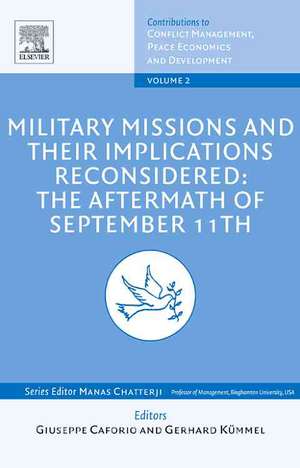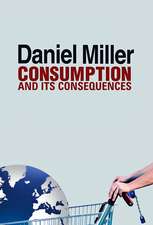Military Missions and Their Implications Reconsi – The Aftermath of September 11th: Contributions to Conflict Management, Peace Economics and Development
Autor G. Kuemmel, Giuseppe Caforio, M. Chatterjien Limba Engleză Hardback – 31 oct 2005
The contributions to this anthology represent the most important and pertinent papers presented at an international meeting organised by the RC 01: Armed Forces &Conflict Resolotion within the International Sociological Association (ISA) which took place in Ankara, Turkey, in July 2004. They focus on the most recent developments in the military sphere and try to assess the impact of September Eleven and the 'new military missions' on the armed forces in terms of, inter alia, conflict management capabilities, social and psychological developments inside military units, recruitment and civil-military relations.
The book is composed by seven chapters. First comes a chapter devoted to conflict resolution. The second chapter deals with the international military activities and their impact on and consequences inside the military institution. The third chapter is devoted to presenting the first results of an empirical, cross-national research project on the divide between the armed forces and their parent societies and on the cultural dimensions of this gap. Families and women in war and in armed forces are the subject of the following chapter. The representation of the interest of military personnel on the agenda is dealt with in the fifth chapter. Several national case studies constitute the contents of the sixth chaper which is particularly focussing on third world countries. The last chapter entails papers which deal with Turkey and its armed forces in various ways.
*This series: Publishes both theoretical and empirical papers on conflict and peace related to economic, social and political development, primarily of the developing countries
*The role of uneven distribution of resources, inequity in income distribution, social and political discrimination, poverty, and arms spending on conflict within and between countries is covered
*The focus is on conflict and its management and possible resolution
Din seria Contributions to Conflict Management, Peace Economics and Development
- 9%
 Preț: 744.56 lei
Preț: 744.56 lei - 9%
 Preț: 633.98 lei
Preț: 633.98 lei -
 Preț: 373.21 lei
Preț: 373.21 lei - 9%
 Preț: 592.17 lei
Preț: 592.17 lei -
 Preț: 371.37 lei
Preț: 371.37 lei - 9%
 Preț: 661.49 lei
Preț: 661.49 lei - 9%
 Preț: 592.10 lei
Preț: 592.10 lei - 23%
 Preț: 905.57 lei
Preț: 905.57 lei - 23%
 Preț: 1030.79 lei
Preț: 1030.79 lei - 23%
 Preț: 1028.53 lei
Preț: 1028.53 lei - 23%
 Preț: 926.13 lei
Preț: 926.13 lei - 23%
 Preț: 919.46 lei
Preț: 919.46 lei - 23%
 Preț: 1517.44 lei
Preț: 1517.44 lei - 23%
 Preț: 990.91 lei
Preț: 990.91 lei - 23%
 Preț: 888.56 lei
Preț: 888.56 lei - 23%
 Preț: 1118.74 lei
Preț: 1118.74 lei - 23%
 Preț: 967.09 lei
Preț: 967.09 lei - 23%
 Preț: 1143.75 lei
Preț: 1143.75 lei - 23%
 Preț: 993.33 lei
Preț: 993.33 lei - 23%
 Preț: 916.87 lei
Preț: 916.87 lei - 23%
 Preț: 745.71 lei
Preț: 745.71 lei - 19%
 Preț: 682.54 lei
Preț: 682.54 lei - 23%
 Preț: 688.31 lei
Preț: 688.31 lei - 19%
 Preț: 680.78 lei
Preț: 680.78 lei - 23%
 Preț: 1072.62 lei
Preț: 1072.62 lei - 23%
 Preț: 1110.06 lei
Preț: 1110.06 lei
Preț: 1008.62 lei
Preț vechi: 1309.90 lei
-23% Nou
Puncte Express: 1513
Preț estimativ în valută:
192.99€ • 202.05$ • 159.69£
192.99€ • 202.05$ • 159.69£
Carte tipărită la comandă
Livrare economică 07-21 aprilie
Preluare comenzi: 021 569.72.76
Specificații
ISBN-13: 9780444519603
ISBN-10: 0444519602
Pagini: 606
Dimensiuni: 152 x 229 x 1295 mm
Greutate: 1.01 kg
Editura: Emerald Publishing
Seria Contributions to Conflict Management, Peace Economics and Development
ISBN-10: 0444519602
Pagini: 606
Dimensiuni: 152 x 229 x 1295 mm
Greutate: 1.01 kg
Editura: Emerald Publishing
Seria Contributions to Conflict Management, Peace Economics and Development
Public țintă
EconomistsCuprins
Part i: Introduction 1. Introduction (G. Caforio, G. Kuemmel). >Part ii: Conflict Resolution 2. Military expenditure and development (M. Chatterji).3. Transitions to democracy in Latin America: basic Lines (J.G. Covarrubias). 4. Through little steps: "informal" networks as a resource for peaceful conflict resolution (B. Purkayastha). Part iii: Civil-military relations 5. Introduction (G. Caforio) 6.Civil-military gap issues and dilemmas - a short review (M. Garb).7. Cultural dimensions of civil-military relations in democratic society: The case of Bulgaria (Y. Yanakiev). 8. The cultural gap between the military and the parent society in Germany (S. Collmer) 9. The cultural gap between the military and the parent society in Italy (G. Caforio). 10. The cultural gap between the military and the parent society in Romania (M. Zulean). 11. The cultural gap between the military and the parent society in Slovenia (M. Garb, L. Jelusic). 12. The cultural gap between the military and the parent society in South Africa (L. Heinecken, R. Gueli). 13. Spain: an equation with difficult solutions( R. Martinez, A.M. Diaz) 14. Is there a cultural gap in civil-military relations in Sweden (A. Weibull).15. Is there a cultural gap between the military relations and parent society? A analysis of Switzerland (T. Szvircsev Tresch, D. Allenspach, M. Born and K.W. Haltiner). Part iv: Women, conflict and the military 16. Women in an insecure world (M. Vlachová) 17 Rape in war; realities and remedies (J. A. Willenz). 18 Challenging psychosocial responses to female civilians in armed conflict (P. Bell) 19. Integrating the 'other': The Bundeswehr and women soldiers (G. Kuemmel). 20 Factors that limit the true integration of women at military academies (H. L. Smith, C.J. Luedtke).Part v: Transformations in the military21 Caring leadership: Preparing leaders to are for soldiers and families (T. Woodruff). 22 Multinationality as a challenge to the armed forces (K. Haltiner, P. Klein). 23 Total force in Iraq: A failure of policy or implication (R. Thompson).24 Korean reserve forces: Their mission reconsidered (D.-S. Hong). 25 Defense transformation as a Latin American Case (J.G. Covarrubias). Part vi: Motivation in peace support operations 26. Who wants to go again? Motivation of German soldiers for and during peacekeeping missions (M. Tomforde, J. Keller). 27 Motivation and job satisfaction of Slovenian soldiers and policemen in peace operations (L. Jelusic, M. Garb). 28 Motivation and mission satisfaction in the 5th Swisscoy contingent (J. Bennett, R.P. Boesch, K.W> Haltiner). Part vii: Military unionism 29 Independent Representation in the British Army: Has the time finally arrived? (R. Bartle). 30 Freedom of association and the Canadian forces: Current status and future trends (K. Farley, R. Walker, H. Bondy and D. Mendoza). 31 Military representation in the Italian armed forces in the turn from conscription to professional format (E. Olivetta). 32 South Africa: Ten years of military unionism (L. Heinecken). Part viii: The Turkish military in transition33. Introduction (A. Kadir Varoglu) 34 The Turkish military ethos and its compatibility with national cultures (A. K. Varoglu, U. Sigri, E. Isin). 35 Opinions of civil society organizations on democracy and army in Turkey (B. Aksit, A. Serdar, B. Tabakoglu). 36 The Turkish military academy from a gender perspective (C. Kuloglu), 37 A un type conflict management: Dilemmas of military observer missions in the example of unomig (M. Uyar).












